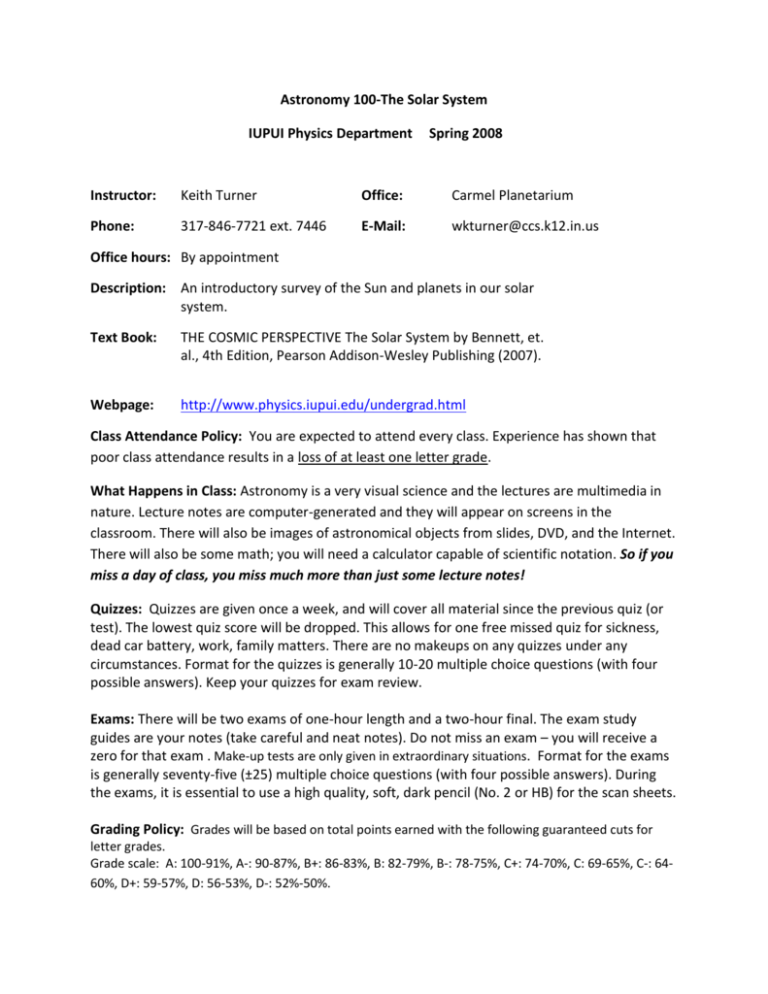
Astronomy 100-The Solar System
IUPUI Physics Department
Spring 2008
Instructor:
Keith Turner
Office:
Carmel Planetarium
Phone:
317-846-7721 ext. 7446
E-Mail:
wkturner@ccs.k12.in.us
Office hours: By appointment
Description: An introductory survey of the Sun and planets in our solar
system.
Text Book:
THE COSMIC PERSPECTIVE The Solar System by Bennett, et.
al., 4th Edition, Pearson Addison-Wesley Publishing (2007).
Webpage:
http://www.physics.iupui.edu/undergrad.html
Class Attendance Policy: You are expected to attend every class. Experience has shown that
poor class attendance results in a loss of at least one letter grade.
What Happens in Class: Astronomy is a very visual science and the lectures are multimedia in
nature. Lecture notes are computer-generated and they will appear on screens in the
classroom. There will also be images of astronomical objects from slides, DVD, and the Internet.
There will also be some math; you will need a calculator capable of scientific notation. So if you
miss a day of class, you miss much more than just some lecture notes!
Quizzes: Quizzes are given once a week, and will cover all material since the previous quiz (or
test). The lowest quiz score will be dropped. This allows for one free missed quiz for sickness,
dead car battery, work, family matters. There are no makeups on any quizzes under any
circumstances. Format for the quizzes is generally 10-20 multiple choice questions (with four
possible answers). Keep your quizzes for exam review.
Exams: There will be two exams of one-hour length and a two-hour final. The exam study
guides are your notes (take careful and neat notes). Do not miss an exam – you will receive a
zero for that exam . Make-up tests are only given in extraordinary situations. Format for the exams
is generally seventy-five (±25) multiple choice questions (with four possible answers). During
the exams, it is essential to use a high quality, soft, dark pencil (No. 2 or HB) for the scan sheets.
Grading Policy: Grades will be based on total points earned with the following guaranteed cuts for
letter grades.
Grade scale: A: 100-91%, A-: 90-87%, B+: 86-83%, B: 82-79%, B-: 78-75%, C+: 74-70%, C: 69-65%, C-: 6460%, D+: 59-57%, D: 56-53%, D-: 52%-50%.
Jan. 10
Start of Semester; Our Place in the Universe
Jan. 17
Quiz #1; Discovering the Universe for Yourself
Jan. 24
Quiz #2; The Science of Astronomy
Jan. 31
Quiz #3; Gravity and Light
Feb 7
Quiz #4; Our planetary system
Feb. 14
Quiz #5; Formation of the Solar System
Feb. 21
Quiz #6; Inner Solar System
Feb. 28
Hour Exam #1; Mars
Mar. 6
Quiz #7; Jovian Planets
Mar. 13
Spring Break-No class
Mar. 20
Quiz #8; Pluto and other solar system debris
Mar. 27
Quiz #9; Extra Solar Planets
April 3
Quiz #10; Our Star the Sun
April 10
Quiz #11; TBA
April 17
Hour exam #2; Life in the Universe
April 24
Final Review; Course Wrap up
May 1
Final Exam





